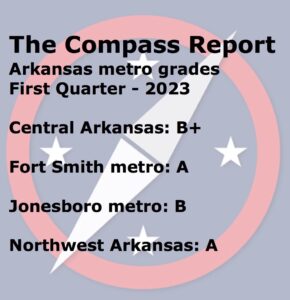The Compass Report: Arkansas, metro area economies ‘robust’ to begin 2023
by June 13, 2023 4:36 pm 1,767 views

Arkansas’ four top metro areas are healthy with “robust” and “stable” job growth a common factor in the regions, according to the first quarter 2023 The Compass Report. Job numbers are solid nationwide, although data shows a slowdown in the broader U.S. economy.
The Compass Report is a partnership between the University of Arkansas at Fort Smith and Talk Business & Politics. First National Bank of Fort Smith is a sponsor of the statewide report.
The report measures four leading and four current economic indicators to provide a grade for a regional economy. The eight categories measured to determine The Compass Report grade in the Central Arkansas, Fort Smith and Northwest Arkansas areas are total nonfarm jobs, unemployment rate, building permits, sales tax revenue, manufacturing jobs, service sector jobs, construction jobs, tourism jobs and concentration of manufacturing jobs. Because the data is not available, construction and tourism jobs are not included in the Jonesboro metro grade.
In the first quarter 2023 report, Central Arkansas received a “B+” grade, the Fort Smith metro had an “A” grade, the Jonesboro area received a “B” grade, and Northwest Arkansas had an “A” grade.
A key factor in understanding the report is in understanding the “grading” approach used to measure the current and leading economic indicators. For example, a grade of “C” reflects no change in economic activity. The grades “B” or “A” indicate improvement above the historical average, and “D” and “F” indicate a decline in economic activity compared to the historical average.
Kendall Ross, executive director of the University of Arkansas at Fort Smith Center for Economic Development, said the national economic slowdown could be attributed to persistent inflation and aggressive rate hikes by the Federal Reserve aimed at addressing rising prices.

“U.S. economic growth significantly slowed in the first quarter 2023, with GDP growing at an annualized rate of 1.1%, down from 2.6% in the previous quarter,” Ross noted in the report. “Household spending increased by 3.7% during the first quarter, driven by strong consumer spending, but concerns about the sustainability of this growth emerged as consumer sentiment deteriorated towards the end of the quarter.”
Following are some of Ross’ key takeaways in the four metro areas.
• Central Arkansas
Overall, the economic conditions show positive employment growth in various sectors, though with fluctuations and variations. The low unemployment rate indicates a solid economic performance in the largest metro area of the state. However, the construction sector experienced a notable decline in building permit valuation, suggesting challenges in that industry.
• Fort Smith metro
Data for the Fort Smith regional economy remains strong. Overall, the Fort Smith area shows signs of economic growth, with increased employment across various sectors, a rebounding manufacturing sector, positive tax revenue trends, and a declining unemployment rate. These indicators point towards a positive economic condition and potential economic revitalization in the region.
 • Jonesboro metro
• Jonesboro metro
The economic conditions in the Jonesboro metro area have been positive during the first quarter of 2023. However, the valuation of building permits in the construction sector experienced a substantial decrease, receiving a grade of D. Overall, the economic conditions in the Jonesboro metro area demonstrate positive employment growth and stable unemployment rates.
• Northwest Arkansas
The data indicates a favorable economic situation in Northwest Arkansas, characterized by robust expansion in non-farm employment, multiple sectors achieving record-high employment levels, low unemployment rates, and steady growth in the labor force. While there were variations in building permit valuation and mixed performance in the construction sector, the overall economic outlook remains positive.
 Greg Kaza, an economist and executive director of the Arkansas Policy Foundation, said the solid economic gains in Arkansas come with a caveat.
Greg Kaza, an economist and executive director of the Arkansas Policy Foundation, said the solid economic gains in Arkansas come with a caveat.
“One can describe it as the ‘Yes but’ economic expansion. Yes, nonfarm employment expanded in all four Arkansas metropolitan statistical areas, earning A-plus grades. Yes, unemployment rates are at near-record or record-low rates in all four areas, including an incredible 2% in Fayetteville-Springdale-Rogers. Yes, other indicators show economic growth. But it doesn’t feel like a good times expansion because the ‘persistent inflation’ cited in the report continues despite aggressive Fed rate hikes,” Kaza noted.
Link here for the raw data gathered by the University of Arkansas at Fort Smith Center for Economic Development.
Link here for the quarterly narrative.
